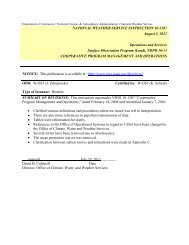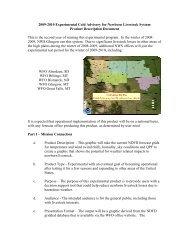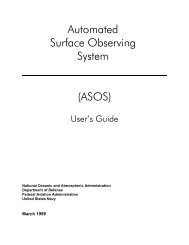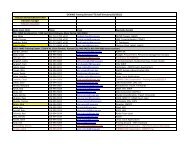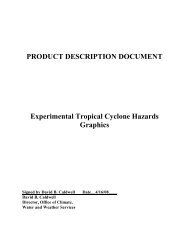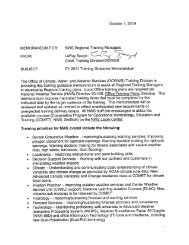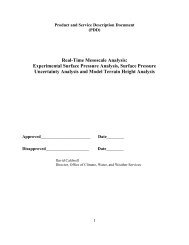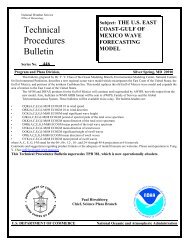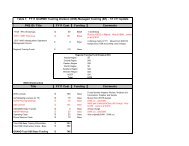Section 7: Outreach and Education Activities - NOAA
Section 7: Outreach and Education Activities - NOAA
Section 7: Outreach and Education Activities - NOAA
You also want an ePaper? Increase the reach of your titles
YUMPU automatically turns print PDFs into web optimized ePapers that Google loves.
Severe Weather Spotter Training<br />
Severe weather spotter classes introduce a variety of identification techniques to spotters that enable<br />
them to properly identify <strong>and</strong> report severe weather events to the local WFOs. Additionally, spotters<br />
are taught how to identify cloud features that usually precede the development of tornadoes <strong>and</strong> straight<br />
-line winds.<br />
Importance of Spotters<br />
Spotters are needed to verify what the NWS Doppler radar system is detecting, which includes everything<br />
from a tornado to heavy snow. Doppler radar can not see below cloud base for features beyond<br />
about 50 miles from the radar site, <strong>and</strong> spotters provide ground-truth information by reporting what is<br />
happening at the cloud base. Spotter information is used directly in the warning decision process.<br />
Setting Up a Spotter Class<br />
In most cases, the county emergency management director, or a Tribal government official, will request that a spotter<br />
class(es) be held in their county or Tribal Nation. Additionally, a safety officer of a business or academic institution may<br />
request a spotter class for their security staff, especially if they are working toward a StormReady® designation. Requests<br />
from other individuals are coordinated with the WCM. In some cases, a ham radio club may set up a spotter class<br />
for only their membership. Typically, the county EM director determines how many classes will be held in their county<br />
(from one to four per year.) The population of the county or Tribal Nation, <strong>and</strong> the number of counties within the County<br />
Warning Area will also have an effect on the number of spotter classes. If a county or Tribal Nation has a large population,<br />
then more than one spotter class may be needed. On the other h<strong>and</strong>, if a WFO is responsible for a large number<br />
of counties, then some counties may have to be combined in some years or entirely skipped.<br />
Who Can Attend Spotter Classes?<br />
Depending on a county’s or Tribal Nation’s internal policy, some classes will be restricted to only first responders (EMs,<br />
law enforcement, fire fighters, 911 dispatchers, etc.), while other classes are open to all spotters, government agencies<br />
<strong>and</strong> the general public (one doesn’t have to be a spotter in order to attend). Some classes may be restricted to only amateur<br />
radio operators. Ultimately, the person who requested the spotter talk determines who attends.<br />
There is no hard, fast rule for age limit of who is<br />
welcome to attend spotter training, but experience<br />
has shown that the most effective spotters are at<br />
least 16 years old.<br />
When Are Spotter Classes Held?<br />
Most spotter classes are conducted during the<br />
months of January, February, March, April <strong>and</strong><br />
May. Classes are held earlier in the year in the<br />
southern states <strong>and</strong> later in Spring in the northern<br />
states. Normally, the classes are held in the evening<br />
in order to maximize attendance. However, depending<br />
on the county, some classes are held in the<br />
afternoon or even in the morning in order to minimize<br />
overtime paid to county or city employees. In<br />
some cases, an early morning class may be held for<br />
county highway departments or law enforcement<br />
officials. The county’s EM director will have a feel for what is best for their county.<br />
Depending on local requirements, some spotter classes may be conducted in the summer, fall, or winter seasons. The<br />
WCM <strong>and</strong> Emergency Manager will determine if <strong>and</strong> when spotter classes are held.<br />
11




